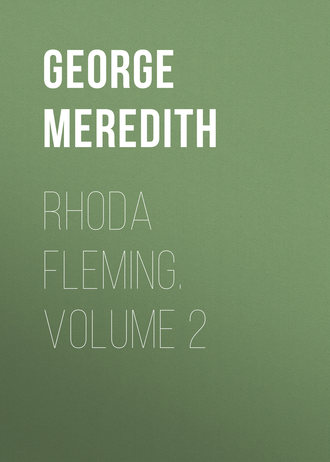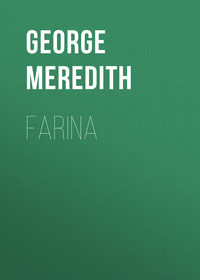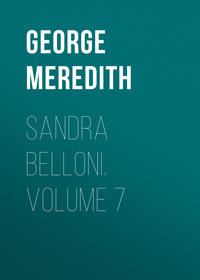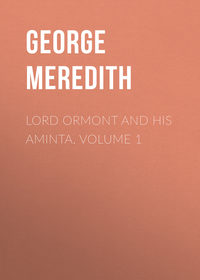
Rhoda Fleming. Volume 2
"To-morrow's a day too late," said the farmer, gravely. Whereto replying, "Oh! well, come along in, then," the squire led the way.
"You're two to one, if it's a transaction," he said, nodding to Robert to close the library door. "Take seats. Now then, what is it? And if I make a face, just oblige me by thinking nothing about it, for my gout's beginning to settle in the leg again, and shoots like an electric telegraph from purgatory."
He wheezed and lowered himself into his arm-chair; but the farmer and
Robert remained standing, and the farmer spoke:—
"My words are going to be few, squire. I've got a fact to bring to your knowledge, and a question to ask."
Surprise, exaggerated on his face by a pain he had anticipated, made the squire glare hideously.
"Confound it, that's what they say to a prisoner in the box. Here's a murder committed:—Are you the guilty person? Fact and question! Well, out with 'em, both together."
"A father ain't responsible for the sins of his children," said the farmer.
"Well, that's a fact," the squire emphasized. "I've always maintained it; but, if you go to your church, farmer—small blame to you if you don't; that fellow who preaches there—I forget his name—stands out for just the other way. You are responsible, he swears. Pay your son's debts, and don't groan over it:—He spent the money, and you're the chief debtor; that's his teaching. Well: go on. What's your question?"
"A father's not to be held responsible for the sins of his children, squire. My daughter's left me. She's away. I saw my daughter at the theatre in London. She saw me, and saw her sister with me. She disappeared. It's a hard thing for a man to be saying of his own flesh and blood. She disappeared. She went, knowing her father's arms open to her. She was in company with your son."
The squire was thrumming on the arm of his chair. He looked up vaguely, as if waiting for the question to follow, but meeting the farmer's settled eyes, he cried, irritably, "Well, what's that to me?"
"What's that to you, squire?"
"Are you going to make me out responsible for my son's conduct? My son's a rascal—everybody knows that. I paid his debts once, and I've finished with him. Don't come to me about the fellow. If there's a greater curse than the gout, it's a son."
"My girl," said the farmer, "she's my flesh and blood, and I must find her, and I'm here to ask you to make your son tell me where she's to be found. Leave me to deal with that young man—leave you me! but I want my girl."
"But I can't give her to you," roared the squire, afflicted by his two great curses at once. "Why do you come to me? I'm not responsible for the doings of the dog. I'm sorry for you, if that's what you want to know. Do you mean to say that my son took her away from your house?"
"I don't do so, Mr. Blancove. I'm seeking for my daughter, and I see her in company with your son."
"Very well, very well," said the squire; "that shows his habits; I can't say more. But what has it got to do with me?"
The farmer looked helplessly at Robert.
"No, no," the squire sung out, "no interlopers, no interpreting here. I listen to you. My son—your daughter. I understand that, so far. It's between us two. You've got a daughter who's gone wrong somehow: I'm sorry to hear it. I've got a son who never went right; and it's no comfort to me, upon my word. If you were to see the bills and the letters I receive! but I don't carry my grievances to my neighbours. I should think, Fleming, you'd do best, if it's advice you're seeking, to keep it quiet. Don't make a noise about it. Neighbours' gossip I find pretty well the worst thing a man has to bear, who's unfortunate enough to own children."
The farmer bowed his head with that bitter humbleness which characterized his reception of the dealings of Providence toward him.
"My neighbours 'll soon be none at all," he said. "Let 'em talk. I'm not abusing you, Mr. Blancove. I'm a broken man: but I want my poor lost girl, and, by God, responsible for your son or not, you must help me to find her. She may be married, as she says. She mayn't be. But I must find her."
The squire hastily seized a scrap of paper on the table and wrote on it.
"There!" he handed the paper to the farmer; "that's my son's address, 'Boyne's Bank, City, London.' Go to him there, and you'll find him perched on a stool, and a good drubbing won't hurt him. You've my hearty permission, I can assure you: you may say so. 'Boyne's Bank.' Anybody will show you the place. He's a rascally clerk in the office, and precious useful, I dare swear. Thrash him, if you think fit."
"Ay," said the farmer, "Boyne's Bank. I've been there already. He's absent from work, on a visit down into Hampshire, one of the young gentlemen informed me; Fairly Park was the name of the place: but I came to you, Mr. Blancove; for you're his father."
"Well now, my good Fleming, I hope you think I'm properly punished for that fact." The squire stood up with horrid contortions.
Robert stepped in advance of the farmer.
"Pardon me, sir," he said, though the squire met his voice with a prodigious frown; "this would be an ugly business to talk about, as you observe. It would hurt Mr. Fleming in these parts of the country, and he would leave it, if he thought fit; but you can't separate your name from your son's—begging you to excuse the liberty I take in mentioning it— not in public: and your son has the misfortune to be well known in one or two places where he was quartered when in the cavalry. That matter of the jeweller—"
"Hulloa," the squire exclaimed, in a perturbation.
"Why, sir, I know all about it, because I was a trooper in the regiment your son, Mr. Algernon Blancove, quitted: and his name, if I may take leave to remark so, won't bear printing. How far he's guilty before Mr. Fleming we can't tell as yet; but if Mr. Fleming holds him guilty of an offence, your son 'll bear the consequences, and what's done will be done thoroughly. Proper counsel will be taken, as needn't be said. Mr. Fleming applied to you first, partly for your sake as well as his own. He can find friends, both to advise and to aid him."
"You mean, sir," thundered the squire, "that he can find enemies of mine, like that infernal fellow who goes by the title of Reverend, down below there. That'll do, that will do; there's some extortion at the bottom of this. You're putting on a screw."
"We're putting on a screw, sir," said Robert, coolly.
"Not a penny will you get by it."
Robert flushed with heat of blood.
"You don't wish you were a young man half so much as I do just now," he remarked, and immediately they were in collision, for the squire made a rush to the bell-rope, and Robert stopped him. "We're going," he said; "we don't want man-servants to show us the way out. Now mark me, Mr. Blancove, you've insulted an old man in his misery: you shall suffer for it, and so shall your son, whom I know to be a rascal worthy of transportation. You think Mr. Fleming came to you for money. Look at this old man, whose only fault is that he's too full of kindness; he came to you just for help to find his daughter, with whom your rascal of a son was last seen, and you swear he's come to rob you of money. Don't you know yourself a fattened cur, squire though you be, and called gentleman? England's a good place, but you make England a hell to men of spirit. Sit in your chair, and don't ever you, or any of you cross my path; and speak a word to your servants before we're out of the house, and I stand in the hall and give 'em your son's history, and make Wrexby stink in your nostril, till you're glad enough to fly out of it. Now, Mr. Fleming, there's no more to be done here; the game lies elsewhere."
Robert took the farmer by the arm, and was marching out of the enemy's territory in good order, when the squire, who had presented many changeing aspects of astonishment and rage, arrested them with a call. He began to say that he spoke to Mr. Fleming, and not to the young ruffian of a bully whom the farmer had brought there: and then asked in a very reasonable manner what he could do—what measures he could adopt to aid the farmer in finding his child. Robert hung modestly in the background while the farmer laboured on with a few sentences to explain the case, and finally the squire said, that his foot permitting (it was an almost pathetic reference to the weakness of flesh), he would go down to Fairly on the day following and have a personal interview with his son, and set things right, as far as it lay in his power, though he was by no means answerable for a young man's follies.
He was a little frightened by the farmer's having said that Dahlia, according to her own declaration was married, and therefore himself the more anxious to see Mr. Algernon, and hear the truth from his estimable offspring, whom he again stigmatized as a curse terrible to him as his gouty foot, but nevertheless just as little to be left to his own devices. The farmer bowed to these observations; as also when the squire counselled him, for his own sake, not to talk of his misfortune all over the parish.
"I'm not a likely man for that, squire; but there's no telling where gossips get their crumbs. It's about. It's about."
"About my son?" cried the squire.
"My daughter!"
"Oh, well, good-day," the squire resumed more cheerfully. "I'll go down to Fairly, and you can't ask more than that."
When the farmer was out of the house and out of hearing, he rebuked Robert for the inconsiderate rashness of his behaviour, and pointed out how he, the farmer, by being patient and peaceful, had attained to the object of his visit. Robert laughed without defending himself.
"I shouldn't ha' known ye," the farmer repeated frequently; "I shouldn't ha' known ye, Robert."
"No, I'm a trifle changed, may be," Robert agreed. "I'm going to claim a holiday of you. I've told Rhoda that if Dahlia's to be found, I'll find her, and I can't do it by sticking here. Give me three weeks. The land's asleep. Old Gammon can hardly turn a furrow the wrong way. There's nothing to do, which is his busiest occupation, when he's not interrupted at it."
"Mas' Gammon's a rare old man," said the farmer, emphatically.
"So I say. Else, how would you see so many farms flourishing!"
"Come, Robert: you hit th' old man hard; you should learn to forgive."
"So I do, and a telling blow's a man's best road to charity. I'd forgive the squire and many another, if I had them within two feet of my fist."
"Do you forgive my girl Rhoda for putting of you off?"
Robert screwed in his cheek.
"Well, yes, I do," he said. "Only it makes me feel thirsty, that's all."
The farmer remembered this when they had entered the farm.
"Our beer's so poor, Robert," he made apology; "but Rhoda shall get you some for you to try, if you like. Rhoda, Robert's solemn thirsty."
"Shall I?" said Rhoda, and she stood awaiting his bidding.
"I'm not a thirsty subject," replied Robert. "You know I've avoided drink of any kind since I set foot on this floor. But when I drink," he pitched his voice to a hard, sparkling heartiness, "I drink a lot, and the stuff must be strong. I'm very much obliged to you, Miss Rhoda, for what you're so kind as to offer to satisfy my thirst, and you can't give better, and don't suppose that I'm complaining; but your father's right, it is rather weak, and wouldn't break the tooth of my thirst if I drank at it till Gammon left off thinking about his dinner."
With that he announced his approaching departure.
The farmer dropped into his fireside chair, dumb and spiritless. A shadow was over the house, and the inhabitants moved about their domestic occupations silent as things that feel the thunder-cloud. Before sunset Robert was gone on his long walk to the station, and Rhoda felt a woman's great envy of the liberty of a man, who has not, if it pleases him not, to sit and eat grief among familiar images, in a home that furnishes its altar-flame.
CHAPTER XVI
Fairly, Lord Elling's seat in Hampshire, lay over the Warbeach river; a white mansion among great oaks, in view of the summer sails and winter masts of the yachting squadron. The house was ruled, during the congregation of the Christmas guests, by charming Mrs. Lovell, who relieved the invalid Lady of the house of the many serious cares attending the reception of visitors, and did it all with ease. Under her sovereignty the place was delightful, and if it was by repute pleasanter to young men than to any other class, it will be admitted that she satisfied those who are loudest in giving tongue to praise.
Edward and Algernon journeyed down to Fairly together, after the confidence which the astute young lawyer had been compelled to repose in his cousin. Sir William Blancove was to be at Fairly, and it was at his father's pointed request that Edward had accepted Mrs. Lovell's invitation. Half in doubt as to the lady's disposition toward him, Edward eased his heart with sneers at the soft, sanguinary graciousness they were to expect, and racked mythology for spiteful comparisons; while Algernon vehemently defended her with a battering fire of British adjectives in superlative. He as much as hinted, under instigation, that he was entitled to defend her; and his claim being by-and-by yawningly allowed by Edward, and presuming that he now had Edward in his power and need not fear him, he exhibited his weakness in the guise of a costly gem, that he intended to present to Mrs. Lovell—an opal set in a cross pendant from a necklace; a really fine opal, coquetting with the lights of every gem that is known: it shot succinct red flashes, and green, and yellow; the emerald, the amethyst, the topaz lived in it, and a remote ruby; it was veined with lightning hues, and at times it slept in a milky cloud, innocent of fire, quite maidenlike.
"That will suit her," was Edward's remark.
"I didn't want to get anything common," said Algernon, making the gem play before his eyes.
"A pretty stone," said Edward.
"Do you think so?"
"Very pretty indeed."
"Harlequin pattern."
"To be presented to Columbine!"
"The Harlequin pattern is of the best sort, you know. Perhaps you like the watery ones best? This is fresh from Russia. There's a set I've my eye on. I shall complete it in time. I want Peggy Lovell to wear the jolliest opals in the world. It's rather nice, isn't it?"
"It's a splendid opal," said Edward.
"She likes opals," said Algernon.
"She'll take your meaning at once," said Edward.
"How? I'll be hanged if I know what my meaning is, Ned."
"Don't you know the signification of your gift?"
"Not a bit."
"Oh! you'll be Oriental when you present it."
"The deuce I shall!"
"It means, 'You're the prettiest widow in the world.'"
"So she is. I'll be right there, old boy."
"And, 'You're a rank, right-down widow, and no mistake; you're everything to everybody; not half so innocent as you look: you're green as jealousy, red as murder, yellow as jaundice, and put on the whiteness of a virgin when you ought to be blushing like a penitent.' In short, 'You have no heart of your own, and you pretend to possess half a dozen: you're devoid of one steady beam, and play tricks with every scale of colour: you're an arrant widow, and that's what you are.' An eloquent gift, Algy."
"Gad, if it means all that, it'll be rather creditable to me," said
Algernon. "Do opals mean widows?"
"Of course," was the answer.
"Well, she is a widow, and I suppose she's going to remain one, for she's had lots of offers. If I marry a girl I shall never like her half as much as Peggy Lovell. She's done me up for every other woman living. She never lets me feel a fool with her; and she has a way, by Jove, of looking at me, and letting me know she's up to my thoughts and isn't angry. What's the use of my thinking of her at all? She'd never go to the Colonies, and live in a log but and make cheeses, while I tore about on horseback gathering cattle."
"I don't think she would," observed Edward, emphatically; "I don't think she would."
"And I shall never have money. Confound stingy parents! It's a question whether I shall get Wrexby: there's no entail. I'm heir to the governor's temper and his gout, I dare say. He'll do as he likes with the estate. I call it beastly unfair."
Edward asked how much the opal had cost.
"Oh, nothing," said Algernon; "that is, I never pay for jewellery."
Edward was curious to know how he managed to obtain it.
"Why, you see," Algernon explained, "they, the jewellers—I've got two or three in hand—the fellows are acquainted with my position, and they speculate on my expectations. There is no harm in that if they like it. I look at their trinkets, and say, 'I've no money;' and they say, 'Never mind;' and I don't mind much. The understanding is, that I pay them when I inherit."
"In gout and bad temper?"
"Gad, if I inherit nothing else, they'll have lots of that for indemnification. It's a good system, Ned; it enables a young fellow like me to get through the best years of his life—which I take to be his youth—without that squalid poverty bothering him. You can make presents, and wear a pin or a ring, if it takes your eye. You look well, and you make yourself agreeable; and I see nothing to complain of in that."
"The jewellers, then, have established an institution to correct one of the errors of Providence."
"Oh! put it in your long-winded way, if you like," said Algernon; "all I know is, that I should often have wanted a five-pound note, if—that is, if I hadn't happened to be dressed like a gentleman. With your prospects, Ned, I should propose to charming Peggy tomorrow morning early. We mustn't let her go out of the family. If I can't have her, I'd rather you would."
"You forget the incumbrances on one side," said Edward, his face darkening.
"Oh! that's all to be managed," Algernon rallied him. "Why, Ned, you'll have twenty thousand a-year, if you have a penny; and you'll go into Parliament, and give dinners, and a woman like Peggy Lovell 'd intrigue for you like the deuce."
"A great deal too like," Edward muttered.
"As for that pretty girl," continued Algernon; but Edward peremptorily stopped all speech regarding Dahlia. His desire was, while he made holiday, to shut the past behind a brazen gate; which being communicated sympathetically to his cousin, the latter chimed to it in boisterous shouts of anticipated careless jollity at Fairly Park, crying out how they would hunt and snap fingers at Jews, and all mortal sorrows, and have a fortnight, or three weeks, perhaps a full month, of the finest life possible to man, with good horses, good dinners, good wines, good society, at command, and a queen of a woman to rule and order everything. Edward affected a disdainful smile at the prospect; but was in reality the weaker of the two in his thirst for it.
They arrived at Fairly in time to dress for dinner, and in the drawing-room Mrs. Lovell sat to receive them. She looked up to Edward's face an imperceptible half-second longer than the ordinary form of welcome accords—one of the looks which are nothing at all when there is no spiritual apprehension between young people, and are so much when there is. To Algernon, who was gazing opals on her, she simply gave her fingers. At her right hand, was Sir John Capes, her antique devotee; a pure milky-white old gentleman, with sparkling fingers, who played Apollo to his Daphne, and was out of breath. Lord Suckling, a boy with a boisterous constitution, and a guardsman, had his place near her left hand, as if ready to seize it at the first whisper of encouragement or opportunity. A very little lady of seventeen, Miss Adeline Gosling, trembling with shyness under a cover of demureness, fell to Edward's lot to conduct down to dinner, where he neglected her disgracefully. His father, Sir William, was present at the table, and Lord Elling, with whom he was in repute as a talker and a wit. Quickened with his host's renowned good wine (and the bare renown of a wine is inspiriting), Edward pressed to be brilliant. He had an epigrammatic turn, and though his mind was prosaic when it ran alone, he could appear inventive and fanciful with the rub of other minds. Now, at a table where good talking is cared for, the triumphs of the excelling tongue are not for a moment to be despised, even by the huge appetite of the monster Vanity. For a year, Edward had abjured this feast. Before the birds appeared and the champagne had ceased to make its circle, he felt that he was now at home again, and that the term of his wandering away from society was one of folly. He felt the joy and vigour of a creature returned to his element. Why had he ever quitted it? Already he looked back upon Dahlia from a prodigious distance. He knew that there was something to be smoothed over; something written in the book of facts which had to be smeared out, and he seemed to do it, while he drank the babbling wine and heard himself talk. Not one man at that table, as he reflected, would consider the bond which held him in any serious degree binding. A lady is one thing, and a girl of the class Dahlia had sprung from altogether another. He could not help imagining the sort of appearance she would make there; and the thought even was a momentary clog upon his tongue. How he used to despise these people! Especially he had despised the young men as brainless cowards in regard to their views of women and conduct toward them. All that was changed. He fancied now that they, on the contrary, would despise him, if only they could be aware of the lingering sense he entertained of his being in bondage under a sacred obligation to a farmer's daughter.
But he had one thing to discover, and that was, why Sir William had made it a peculiar request that he should come to meet him here. Could the desire possibly be to reconcile him with Mrs. Lovell? His common sense rejected the idea at once: Sir William boasted of her wit and tact, and admired her beauty, but Edward remembered his having responded tacitly to his estimate of her character, and Sir William was not the man to court the alliance of his son with a woman like Mrs. Lovell. He perceived that his father and the fair widow frequently took counsel together. Edward laughed at the notion that the grave senior had himself become fascinated, but without utterly scouting it, until he found that the little lady whom he had led to dinner the first day, was an heiress; and from that, and other indications, he exactly divined the nature of his father's provident wishes. But this revelation rendered Mrs. Lovell's behaviour yet more extraordinary. Could it be credited that she was abetting Sir William's schemes with all her woman's craft? "Has she," thought Edward, "become so indifferent to me as to care for my welfare?" He determined to put her to the test. He made love to Adeline Gosling. Nothing that he did disturbed the impenetrable complacency of Mrs. Lovell. She threw them together as she shuffled the guests. She really seemed to him quite indifferent enough to care for his welfare. It was a point in the mysterious ways of women, or of widows, that Edward's experience had not yet come across. All the parties immediately concerned were apparently so desperately acquiescing in his suit, that he soon grew uneasy. Mrs. Lovell not only shuffled him into places with the raw heiress, but with the child's mother; of whom he spoke to Algernon as of one too strongly breathing of matrimony to appease the cravings of an eclectic mind.
"Make the path clear for me, then," said Algernon, "if you don't like the girl. Pitch her tales about me. Say, I've got a lot in me, though I don't let it out. The game's up between you and Peggy Lovell, that's clear. She don't forgive you, my boy."
"Ass!" muttered Edward, seeing by the light of his perception, that he was too thoroughly forgiven.
A principal charm of the life at Fairly to him was that there was no one complaining. No one looked reproach at him. If a lady was pale and reserved, she did not seem to accuse him, and to require coaxing. All faces here were as light as the flying moment, and did not carry the shadowy weariness of years, like that burdensome fair face in the London lodging-house, to which the Fates had terribly attached themselves. So, he was gay. He closed, as it were, a black volume, and opened a new and a bright one. Young men easily fancy that they may do this, and that when the black volume is shut the tide is stopped. Saying, "I was a fool," they believe they have put an end to the foolishness. What father teaches them that a human act once set in motion flows on for ever to the great account? Our deathlessness is in what we do, not in what we are. Comfortable Youth thinks otherwise.









